
A new report by the National Center for Learning Disabilities investigates the overrepresentation of young people with disabilities -and specifically those affecting learning- in the US juvenile justice system, often as a result of school policies that facilitate their transfer from the education system to the criminal justice system. The report highlights statistics which reveal that students with disabilities are three times more likely to be arrested than their non-disabled peers, and are estimated to make up 65%-70% of young people involved with the juvenile justice system.
The report begins by looking at the reasons behind these statistics in the educational systems, pointing out issues such as the general lack of knowledge regarding the identification and support of young people with disabilities, a punitive school culture with exclusionary school discipline, and the involvement of law enforcement agents in schools and use of school-based arrests.
This publication closes with six recommendations for both the educational and justice systems to better understand and support youth with disabilities, from modernising the Education Guidance from the Department of Education to improving the services for young people with disabilities in the juvenile justice system.